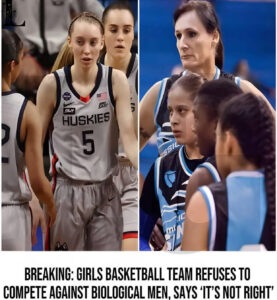In a move that has reignited the ongoing debate about gender and competitive fairness in sports, a girls’ high school basketball team recently made headlines by refusing to play against a team with biological male players. Their reasoning was simple yet profound: “It’s not right.” This decision, while stirring controversy, also highlights the complex and sensitive issues surrounding gender identity and sports fairness.
At the heart of this controversy lies the question of how gender identity intersects with sports. For years, the participation of transgender athletes in competitive sports has been a topic of heated debate. Advocates for transgender rights argue for inclusivity and the right for athletes to compete in accordance with their gender identity. Critics, however,
voice concerns about the fairness of such participation, especially in female sports, pointing to the potential physical advantages of athletes who have undergone male puberty.
The girls’ basketball team’s decision not to compete raises critical questions about the nature of fair competition. Is it fair to ask young female athletes to compete against someone who may have inherent physiological advantages? Conversely, is it fair to exclude athletes from competing in categories that align with their gender identity? This is the crux of the dilemma facing sports today.
Biological differences, particularly those affecting athletic performance, are well-documented. These include differences in muscle mass, bone density, and testosterone levels,
which can confer advantages in physical strength and endurance. Critics argue that these differences can provide transgender women, particularly those who transition after puberty, with an unfair advantage in sports.
